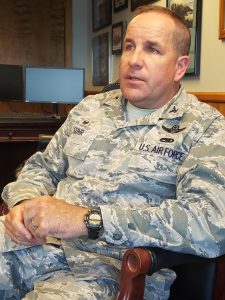
US Air Force Col. James Suhr, commander of the Barnes Air Reserve Base and the 104th Fighter Wing (WNG file photo)
WESTFIELD—For US Air Force Col. James Suhr, his command of the Barnes Air Reserve Base and the 104th Fighter Wing is a unique one.
That’s because Suhr is one of just two active duty Air Force members in the country to be a wing commander of an Air National Guard base. And with this unique assignment over the next year and a half to two years, Suhr hopes to expand the knowledge of both active duty and reserve members, while also providing residents of Westfield clarity and harmonious coexistence, especially in relation to the current issues surrounding the base.
“Command found a place in Massachusetts where I can fit in,” Suhr said about his placement at Barnes. “We’re trying to increase the knowledge pool of the Air National Guard. Increasing the knowledge of the Guard in active duty.”
Suhr comes to the position with a lengthy background in military, pilot and leadership positions. His military career started in 1993. After getting a bachelors in journalism from West Virginia University, Suhr went to Lubbock, Texas with the Air Force and first focused on aircraft maintenance and officer training. Eventually, in the late 1990s to early 2000s, Suhr followed a dream that he had and became a fighter pilot for the Air Force.
“I always knew I wanted to be a pilot,” he said.
Suhr started by piloting the F-15C, the same type of planes that are flown out of Barnes Air Reserve Base today. His missions included protecting a no-fly zone in Iraq in 2001, as well as Middle East coverage in Qatar from 2007 to 2008, and service within the United Arab Emirates from 2014 to 2015. Overall, Suhr said that he has compiled over 2,100 flight hours, and as part of his active duty obligations, still partakes in regular training.
“I’m required [to fly] five times a month to be considered mission ready,” he said.
Suhr’s leadership positions have included being a commander for expeditionary and support squadrons, as well as director of staff, AF/A3, at the Pentagon, among others.
Now, Suhr takes those experiences and attempts to lead the Air National Guard at Barnes, which can see as many as 1,000 troops in a given weekend, in addition to at least 18 F-15C jets.
“There’s about 1,000 people on base full-time and part-time, 400 full-time roughly, and drill weekend about 1,000 people,” Suhr said.
According to Suhr, the distribution of those he oversees falls into four groups: Operations, medical, maintenance and mission support. Each of these groups has their own colonel in charge, but Suhr is the one on top.
But the servicemen and women are not the only ones that Suhr will deal with while on the base.
Complaints from residents have focused on the base for many years, with issues about noise abatement programs and the loudness of jets taking off, to the more recent complaints of possible water contamination of perfluourinated compounds (PFCs), which some have linked to aqueous firefighting foam previously used on the base as a possible source.
“Biggest thing for the water was what [Mayor Brian Sullivan] said—we have federal, state and city government working together,” Suhr said. “Because people seem to think we aren’t working together.”
Suhr added that when it comes to these issues, transparency will be one of the top priorities for him as wing commander.
“We are going to be 100 percent transparent in the process,” he said. “People may get frustrated with how long it takes but that’s the federal process.”
In addition, Suhr said that operations have changed so that the use of firefighting foam, which he said the compound has changed so that it is safer than the previous kind, is rarely done.
“The good news is the way we operate, the only way we use it is with a major event,” Suhr said.
Also, following a use of the foam, Suhr said that there would be thorough cleaning, documentation and a press release sent out to inform others of when it was used.
“We don’t use it unless we need to because it’s expensive and we know the environmental impacts,” he said.

